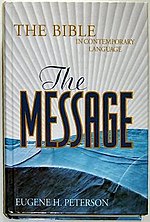The Message (Bible)
| The Message | |
|---|---|
 |
|
| Full name | The Message |
| Abbreviation | MSG |
| Complete Bible published |
2002 |
| Translation type | Idiomatic/Dynamic equivalence/Paraphrase |
| Copyright | Copyright 2002 Eugene H. Peterson |
|
First this: God created the Heavens and Earth--all you see, all you don't see. Earth was a soup of nothingness, a bottomless emptiness, an inky blackness. God's Spirit brooded like a bird above the watery abyss. God spoke: "Light!" And light appeared.
This is how much God loved the world: He gave his Son, his one and only Son. And this is why: so that no one need be destroyed; by believing in him, anyone can have a whole and lasting life.
|
|
The Message: The Bible in Contemporary Language was created and translated by Eugene H. Peterson and published in segments from 1993 to 2002. It is an idiomatic translation of the original languages of the Bible.The Message was translated by Peterson from the original languages. It is a highly idiomatic translation, using contemporary slang from the US rather than a more neutral International English, and it falls on the extreme dynamic end of the dynamic and formal equivalence spectrum.
According to the Introduction to the New Testament of The Message, its “contemporary idiom keeps the language of the Message (Bible) current and fresh and understandable”. Peterson notes that in the course of the project, he realized this was exactly what he had been doing in his thirty-five years as a pastor, “always looking for an English way to make the biblical text relevant to the conditions of the people.”
The Message was published piecemeal over a nine-year period. The New Testament was published in 1993. The Hebrew Bible Wisdom Books were published in 1998. The Hebrew Bible Prophets were published in 2000. The Hebrew Bible Pentateuch were released in 2001. The Books of History came out in 2002. The entire Bible was released the same year and follows the traditional Protestant Biblical canon.
The Message was translated by Peterson from the original languages. It is a highly idiomatic translation, using contemporary slang from the US rather than a more neutral International English, and it falls on the extreme dynamic end of the dynamic and formal equivalence spectrum. Some scholars, like Michael J. Gorman, consider some of Peterson's idiomatic renderings unconventional.
1 The Lord is my shepherd, I lack nothing. 2 He makes me lie down in green pastures, he leads me beside quiet waters, 3 he refreshes my soul. He guides me along the right paths for his name’s sake. 4 Even though I walk through the darkest valley, I will fear no evil, for you are with me; your rod and your staff, they comfort me.
...
Wikipedia
